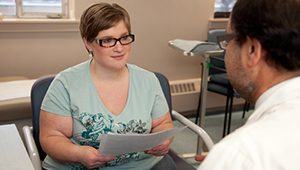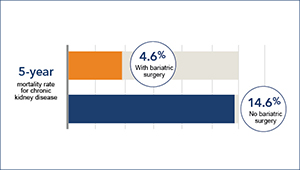Obesity
Research overview
“Obesity is the number-one health problem in the United States because it negatively affects our population’s health more than any other condition,” said Kaiser Permanente Washington Health Research Institute Senior Investigator David Arterburn, MD, MPH. Kaiser Permanente Washington researchers are doing practical research to learn how doctors, patients, families, employers, and policymakers can best work together to prevent and treat obesity.
“We’re focusing on three ways to halt the obesity epidemic,” said Senior Investigator Dori Rosenberg, PhD, MPH. “We’re helping to change obesity-promoting environments, bringing evidence-based prevention and treatment programs into health care systems, and helping people develop lifelong healthy diet and activity habits.”
Kaiser Permanente Washington obesity research areas include:
- reducing sedentary behavior and promoting physical activity and healthy diet in various age groups, populations with chronic conditions, and families;
- shared decision making to help patients find the best way to a healthy weight;
- implementing health coaches in primary care to support behavior changes;
- social networks that support lifestyle change programs;
- relationships between medications and genetic factors in developing obesity;
- health system, community, and national policies that address obesity;
- relationships between obesity and depression, diabetes, and other conditions; and
- long-term benefits and risks of bariatric (weight loss) surgery.
“Obesity is caused by many factors, so at Kaiser Permanente Washington, we’re working on many levels,” said Paula Lozano, MD, MPH, a senior investigator and Kaiser Permanente Washington’s assistant medical director for preventive care. “We’re improving health care to help people who are obese now. But since obesity is a societal problem, we’re also studying how to change our homes and workplaces and neighborhoods to create more healthy environments.”
Recent publications on Obesity
Levine MD, Bush T, Magnusson B, Cheng Y, Chen X. Smoking-related weight concerns and obesity: differences among normal weight, overweight, and obese smokers using a telephone tobacco quitline. Nicotine Tob Res. 2013 Jun;15(6):1136-40. doi: 10.1093/ntr/nts226. Epub 2012 Oct 24. PubMed
Wong ES, Wang BC, Alfonso RC, Flum DR, Sullivan SD, Garrison LP, Arterburn DE. Body mass index trajectories among the severely obese: results from an electronic medical record population. Obesity (Silver Spring). 2012 Oct;20(10):2107-12. doi: 10.1038/oby.2012.29. Epub 2012 Feb 8. PubMed
Fuller S, Ludman E, Mohelnitzky A, Gundersen G, Wellman R, Reid R, Newton K. CC2-01: A telephone-based diabetes prevention program and social support for weight loss: the Call-2-Health study. Clin Med Res. 2012;10(3):143. PubMed
Wood GC, Arterburn D, Westbrook E, Theis K, Boscarino J, Rukstalis M, Still C, Gerhard G. Ca4-05: Electronic health record phenotyping to define rate of extreme weight gain associated with the use of 2nd/3rd generation antipsychotic medications. Clin Med Res. 2012;10(3):185. PubMed
Riggs K, Lozano P, Mohelnitzky A, Richards J, Lorenzo J, Rudnick S. Ps2-25: An adaptation of behavioral pediatric obesity treatment for the real world: results from the Group Health Family Wellness Program pilot trial. Clin Med Res. 2012;10(3):185. PubMed
Researchers in Obesity
 David E. Arterburn, MD, MPHSenior Investigator |
 Allen Cheadle, PhDSenior Investigator, KPWHRI; Senior Research Associate, CCHE |
 Andrea J. Cook, PhDSenior Biostatistics Investigator |
 Maricela Cruz, PhDAssociate Biostatistics Investigator |
 Nicole M. Gatto, PhD, MPHPrincipal Collaborative Scientist |
 Beverly B. Green, MD, MPHSenior Investigator |
 Mikael Anne Greenwood-Hickman, MPHSenior Collaborative Scientist |
 Paula Lozano, MD, MPHSenior Investigator; Director, ACT Center |
 Dori E. Rosenberg, PhD, MPHSenior Investigator |
 Gregory E. Simon, MD, MPHSenior Investigator |











